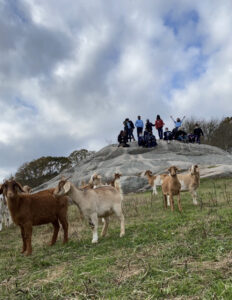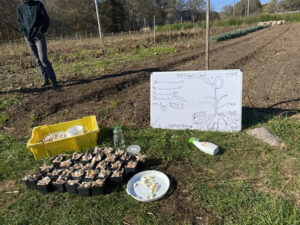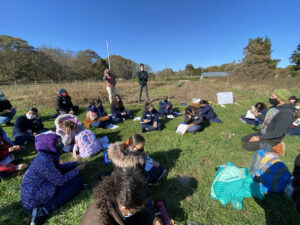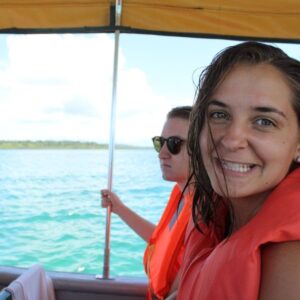The Beauty of Femininity
by Beth Cronin, 2020-2021 Youth Education/Sustainable Agriculture Coordinator with Round the Bend Farm

It goes without saying that this has been a very unconventional year. In my first full season of farming, it felt as though the world changed with the seasons. COVID insecurities seemed to strike every community differently.
With all these changes happening, it was hard to imagine doing anything other than a year of service. I continue to feel very strongly that communities must come together and educate our youth, especially during trying times. It felt, and still feels, as though we are living through history. I was always told that we must study history, in order to not repeat it.
Service for Change
This very concept has become a haunting thought over the last few months. How can we ensure that history will not repeat itself, when racial equality is still being fought for, food insecurity is rising and the corona virus seems to be wedging more of a gap between socioeconomic classes?
Uniquely, my service site is a private non-profit working farm in Southeastern Massachusetts. At Round the Bend (RTB), “We are a living laboratory that cultivates, educates, and empowers people of all ages. We are devoted to the global paradigm shift toward hope and abundance by valuing diversity, modeling nature, and redefining wealth.” These words, taken directly from our website, are values that I feel as though I am truly a part of. I think about these values often, and I look for ways to draw connections between my service position and the farm’s values. My position is split between two different titles, Youth Education Coordinator and Sustainable Agriculture Coordinator. I am expected to split time between roles evenly, so what’s the best way to encompass the duality of my position? Field trips.
Given the craziness of this year, we only agreed to host one field trip at the farm, so we knew we wanted to make the lesson efficient and effective. We did not have several field trips to figure out what works best in terms of tour timing, group splitting and lesson teaching. We only had one shot to pull off a successful day.
A Girl Power Day
We had the 5th grade girls come to the farm, take a tour, and work in the gardens to plant 1,500 cloves of garlic. The field trip fell on the day after the 2020 presidential election. Of course, this election was extra stressful, but sharing the day with young and enthusiastic 5th graders took my mind away from the media and political conversations, and allowed me to be in the moment. However, the whole day I was silently hoping that history would not repeat itself. I was hoping that history would be made. I was surrounded by so many young women, female teachers, myself and my service site partner, Laurel. It was a girl power day.

Before I knew it, I was greeting a bus of 15 girls, all masked up, hand sanitizer flying around. These young women got to escape their everyday routines as fifth graders to come experience and lend a hand at our farm, supporting the curriculum learned in both their Science and Humanities class. This school, known as Our Sister School is an “independent, tuition-free, non-sectarian middle school, (whose goal) is to educate and inspire economically disadvantaged girls from the New Bedford area. Our Sisters’ School empowers girls to step into the future with valuable life skills and a mindset of achievement and excellence by providing a safe, supportive and academically challenging environment.” My experience with these students provided me the opportunity to spend time with alert, invested, intelligent and inquisitive students. It was incredible.
I had heard positive things about the school and the students, and this would be my first time giving any group a tour, teaching a mini-lesson and group planting at Round the Bend. Once we began the day, our big group split up into 2 groups of 8, with Laurel and I tag teaming a small tour. Everything was flowing really nicely, the girls were opening up and asking questions about plants and buildings they saw.
In The Diva Garden
 Our gardens here at RTB appear like patch-work. We have many medium sized plots of land for vegetable crops, and several smaller ‘themed’ gardens. My favorite garden, one that I helped to plant before my service year, is called the Diva Garden. The garden contains many different herbs that can be used as tea, tinctures and topical creams. Every herb in the garden has been used to alleviate different symptoms and side effects of a woman’s period. From alleviating cramping, to mood swings, to regulating flow, the garden appears to be the secret to being a female.
Our gardens here at RTB appear like patch-work. We have many medium sized plots of land for vegetable crops, and several smaller ‘themed’ gardens. My favorite garden, one that I helped to plant before my service year, is called the Diva Garden. The garden contains many different herbs that can be used as tea, tinctures and topical creams. Every herb in the garden has been used to alleviate different symptoms and side effects of a woman’s period. From alleviating cramping, to mood swings, to regulating flow, the garden appears to be the secret to being a female.
As we approached the plot, I felt as though I wanted to have a conversation about periods. We were all female, but I did not want any student to feel uncomfortable. In that moment, all I could remember was how my brain worked when I was in fifth grade.
I got my period for the first time on January 4th when I was in Mrs. Dufault’s 5th grade class. I went to the nurse concerned, asking to be sent home for a stomach ache. I had no idea what was going on with my body. I saw my underwear and recall thinking that I was dying. I got into my mom’s car and couldn’t stop crying. My mom had to teach me on the fly about periods, and being a woman, and how this incredible process that is happening in my body is preparing me to have children one day. I cried and cried, swearing I didn’t want children and I just wanted my body to feel normal again
I remember feeling stressed and anxious all week, hiding from my classmates that I got my period, hoping nobody would ever find out, but feeling as though my body was under a microscope. The level of discomfort I felt in my body during the first few years of my period was completely abnormal. I was ashamed of having my period, my PMS symptoms made me feel out of control, and I just felt like an outsider. I was a fifth grader with 29B boobs. I felt like a monster.
Teaching, in My Own Skin
THAT is where my mind flashed in the middle of my first ever farm tour. To my period. To that bodily frustration. Finally, I began to speak about the process of growing and processing herbs and I said the word menstruation. I watched for signs of discomfort in the students, but they surprised me. As I started my conversation about the herbs in the garden I saw the girls slyly looking at one another. They were okay! They were exchanging glances! One girl literally shrugged her shoulders and nodded her head ‘yes’. At this moment, I felt as though we were rewriting history. Me, laurel and 8 young girls, together on a farm, waiting for the votes to be counted, talking about the beauty and power of herbs, normalizing period talk.
At that moment, I did not want my own history to repeat itself. I wanted those girls to feel like they could talk about their bodies and embrace what it means to be a woman. It took a long time to feel comfortable talking about my period, but now I am able to maintain composure and facilitate a safe space to have these conversations. The truth of this day, having conversations about periods, spending time with an all girls oriented school, showed me how important it is to uplift young women. Instilling confidence and comfort is so important for a young girl to be able to express herself. Even if it’s just for one day on a field trip to a farm, there is immense value.
I am so excited to see where this history leads us all.

Beth (She/Hers) began her service with TerraCorps after graduating from Stonehill College in May with a B.S in Environmental Science and a minor in Spanish. Raised in Holliston, Massachusetts, Beth has always felt at home around farms. She developed her passion for agriculture and growing starting at a young age when she was part of a local 4H organization. She grew up with a strong sense of community and was always guided by the inclination to serve. Learn more about Beth here.
TerraCorps is an environmental nonprofit growing a more equitable ecosystem of people and organizations to protect and steward land for broader good. Visit our website to learn more about serving as a Member or becoming a Service Site Partner organization



 Our gardens here at RTB appear like patch-work. We have many medium sized plots of land for vegetable crops, and several smaller ‘themed’ gardens. My fa
Our gardens here at RTB appear like patch-work. We have many medium sized plots of land for vegetable crops, and several smaller ‘themed’ gardens. My fa